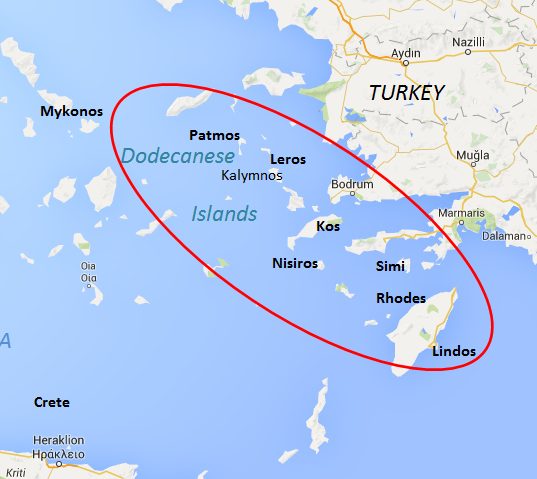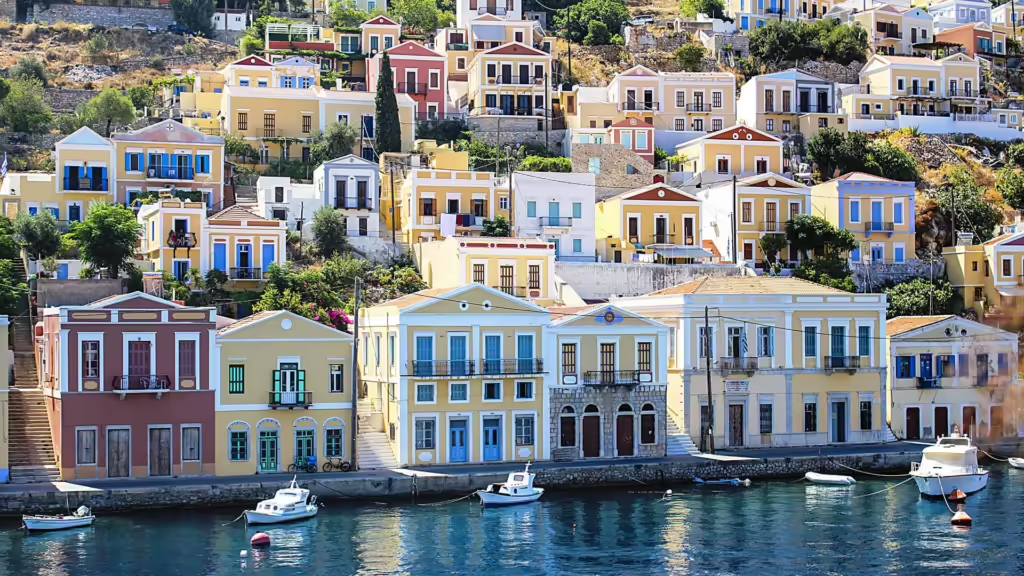The Dodecanese (“12 Islands”) chain includes 150 islands, 26 inhabited, dotting the Aegean Sea between Greece and Turkey, stretching between Patmos on the northwest to Rhodes on the southeast which has made them a meeting point for various cultures and peoples. History buffs will love the Byzantine era architecture and Medieval castles that surprise and delight the eye at every turn. The sailing is magnificent, with steady winds to ease your passage. Here are some islands for you to consider in your itinerary: (Rhodes, Symi, Halki, Tilos, Kos, Nisyros, Astypalaia, Kalymnos, Leros, Patmos, Leipsi, Karpathos, Kaso, and Kastelorizo).
Despite multiple foreign influences, the inhabitants of the Dodecanese have kept alive their Greek language, traditions and customs.
The islands offer unique landscapes with traditional villages, picturesque cobbled streets, and beautiful beaches with crystal-clear seas. The natural diversity of the region combines lush vegetation, seascapes and a colourful animal world, making it an ideal destination for nature lovers. The Dodecanese also offer many holiday options, from cosmopolitan life to tranquil getaways, satisfying the needs of every visitor.
With 15 main and 4 smaller inhabited islands, as well as several uninhabited islets, the Dodecanese have a special gastronomy, influenced by different cultures. Each island has its own identity and attractions, with Rhodes being the capital and most cosmopolitan island of the region.

Gastronomy of the Dodecanese
The Dodecanese islands, scattered across the southeastern Aegean near the coast of Turkey, are a paradise for food lovers. Their cuisine is a vivid fusion of Greek, Turkish, Italian, and Middle Eastern influences, shaped by centuries of trade, occupation, and cultural exchange. The islands are renowned for fresh seafood, aromatic herbs, unique cheeses, and honey-sweet desserts.
The bright sunshine and dry climate of the Dodecanese concentrate the flavours of locally grown produce, so even a simple salad can become a culinary delight. Eating seasonally is a way of life here, and fresh fruits and vegetables elevate every meal to the heights of gastronomy. And while recipes can be recreated anywhere, food in the Dodecanese tastes best shared with family and friends at a seaside taverna, where the sea breeze and convivial atmosphere enhance every bite.
Must-Try Ingredients & Local Specialities
- Seafood: Octopus, kalamari, marinated fish dishes, and flavorful fish stews dominate tables across the islands.
- Cheeses: Each island boasts unique offerings — for example, krasotyri from Kos, a white goat cheese aged in red wine, develops a distinct flavour and a red exterior. Sitaka, a creamy sheep ‘s-milk and goat ‘s-milk cheese, is a local star in Kasos.
- Fruits & Vegetables: Seasonal produce and local specialities, such as fragosika (prickly pear fruit), add freshness and sweetness; on Symi, fragosika is affectionately called the island’s “banana.”
- Herbs & Olive Oil: Locally grown oregano, thyme, sage, rosemary, and bay leaves, along with extra-virgin olive oil, infuse every dish with aromatic depth.
Traditional Dishes to Savour
- Makarounes me sitaka (Kasos): Homemade pasta tossed with creamy sitaka cheese and topped with caramelised onions.
- Gemista: Stuffed vegetables, either with meat or vegetarian, bursting with flavour.
- Dolmadakia: Stuffed grape leaves, a classic alongside gemista; on Kalymnos, they are known as filla.
- Revithokeftedes / Pitaroudia / Pithia: Chickpea fritters, a beloved snack across the islands (pitaroudia in Rhodes, pithia in Nisyros).
- Melekouni (Rhodes): Crunchy sesame and honey bars.
- Kakavia: Fishermen’s fish soup with the day’s catch.
- Kleftiko: Slow-roasted lamb in a sealed clay pot with herbs and olive oil.
- Pasteli & Honey Sweets: Local thyme honey transforms sweets into aromatic treats.
Drinks & Pairings
- Local wines: Rhodes and Kos produce aromatic whites and reds that pair beautifully with seafood and cheese.
- Souma: A traditional spirit distilled from grapes or figs, ideal as a post-meal digestif.
- Herbal infusions: Mountain herbs offer a soothing and aromatic finish to any meal.
The Culinary Culture
Dining in the Dodecanese is communal, relaxed, and celebratory, with meals often lasting hours and featuring the freshest seasonal ingredients. Olive oil, herbs, and seafood dominate the cuisine, reflecting the Mediterranean diet. Festivals and religious holidays bring special dishes — lamb at Easter, almond-and-sesame sweets at weddings — each bite connecting diners to centuries of island life.
In the Dodecanese, food is more than nourishment; it is a reflection of the sun, the sea, and centuries of cultural heritage. Every meal is a sensory journey, where flavours, aromas, and atmosphere combine to create an unforgettable taste of the islands.




